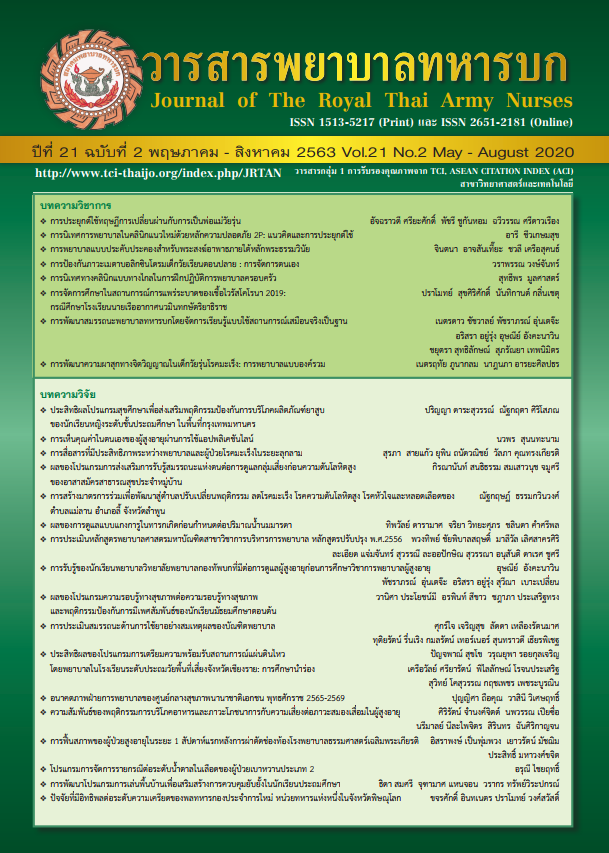The Development of Army Nurses’ Competencies by Using Scenario-Based Training
Keywords:
Army Nurses’ Competencies, Yok-Phirarak Integrated Training Operation, Scenario-based trainingAbstract
The competency of the Royal Thai Army nurses including the ability to provide nursing care in usual situation, disasters and combat fields. Army nurses must provide nursing care that meets professional standards care in both in-hospital and out-of-hospital contexts. The scenario-based training ‘Yok-Phirarak Integrated training Operation’ was initiated in 2014. During phase 1 (2014 - 2016), students were trained how to provide nursing care in mass casualty situations. The training has been continuously developed to phase 2 (2017 - 2019) for graduates’ and institutional identities required from the stakeholders. The current program composes of 4-situation training; (1) conventional warfare, (2) unconventional warfare, (3) peacekeeping operation, and (4) humanitarian assistance and disaster relief mission. The trainees have to integrate both nursing and military knowledge to manage health problems of virtual patients in all 4-scenario-based training. The physical, mentality and knowledge preparation will be provided for 1-2 months before the training starts, so that the trainees can perform nursing care for various types of injuries amidst stressed situations and limited medical resources.
Implication The scenario-based training is useful for developing the competency of nursing students to manage situations which require knowledge integration, experience and appropriate decision making. Furthermore, the training will facilitate the trainees to improve leadership skill, critical thinking and gain more confidence to perform nursing care in future missions.
Downloads
References
2. Bruce S, Holcomb JB. Preparing to Respond: Joint Trauma Training Center and USAF Nursing Warskills Simulation Laboratory. Crit Care Nurs Clin North Am 2003;15:149-62.
3. Ross MC. Military Nursing Competencies. Nurs Clin N Am. 2010;45:169–77.
4. Busapathumrong P. Disaster Management: Welfare Philosophy and Applications. J R Inst Thail 2012;37(3):48–73. (in Thai)
5. Thanawood C, Yongchalermchai C, Densrisereekul O. Effects of the December 2004 tsunami and disaster management in southern Thailand. Science of Tsunami Hazards 2006;24(3):206–17. (in Thai)
6. The Royal Thai Army Nursing College. students’ Manual, Bachelor of Nursing Science Program. 2019; 1-8. (in Thai)
7. Thaiudom A, Meeparn A, Untaja P, Yuroong A, Bohplian S, Ankanawin U, et al. The Intregrated Training Program for Mass Casualty and Diaster Nursing Management. Journal of The Royal Thai Army Nurses. 2018;19(3):77–88. (in Thai)
8. The Royal Thai Army Nursing College. Knowledge Management Manual:Yok-Phirarak Operation. 2018;1-49. (in Thai)
9. Agazio J. Army nursing practice challenges in humanitarian and wartime missions. Int J Nurs Pract 2010;16(2):166–75.
10. Reed S. Debriefing Experience Scale: Development of a Tool to Evaluate the Student Learning Experience in Debriefing. Clin Simul Nurs. 2012;8:211–17.
Downloads
Published
How to Cite
Issue
Section
License
บทความหรือข้อคิดเห็นใดใดที่ปรากฏในวารสารพยาบาลทหารบกเป็นวรรณกรรมของผู้เขียน ซึ่งบรรณาธิการหรือสมาคมพยาบาลทหารบก ไม่จำเป็นต้องเห็นด้วย
บทความที่ได้รับการตีพิมพ์เป็นลิขสิทธิ์ของวารสารพยาบาลทหารบก
The ideas and opinions expressed in the Journal of The Royal Thai Army Nurses are those of the authors and not necessarily those
of the editor or Royal Thai Army Nurses Association.






